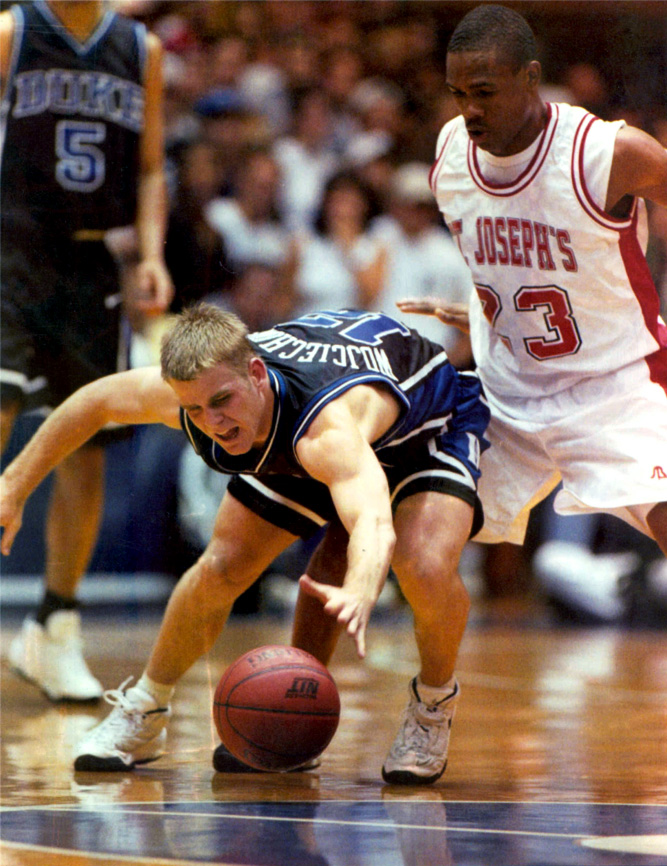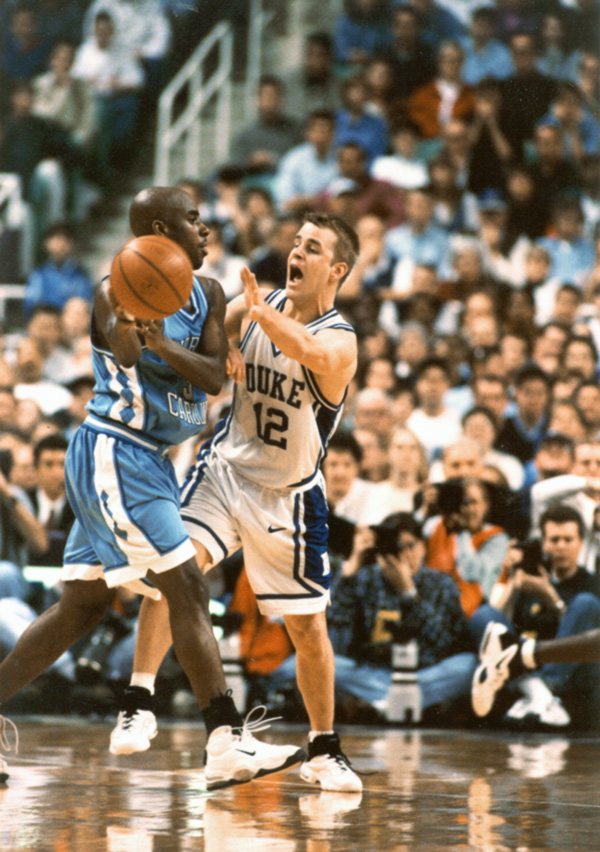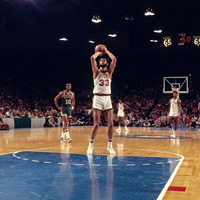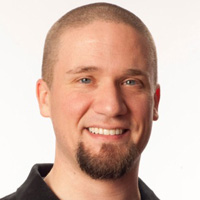Coaches and other players were like ‘this kid is crazy.’ He would do whatever – it did not matter.Josh Davalli
The echo remains for Mike Dahlem, even after 30 years: hair, bone and flesh meeting wood, that supple smack that turns your stomach; the instantaneous ring of the iron under the bleachers that brings your shoulders to your ears. Steve Wojciechowski was just a seventh grader, an uncurbed point guard hurtling for a ball he couldn’t save. Dahlem was a junior varsity coach at Cardinal Gibbons High School in Baltimore, scouting potential players.
He immediately made a call to his head varsity coach, Ray Mullis.
There’s a kid we gotta get and you better come see him before other people know.
Josh Davalli still hears an echo, too.
Five years after Dahlem watched Wojciechowski Superman into the bleachers, the feverish guard was the senior captain at Cardinal Gibbons – and didn’t like the way his team was warming up prior to a game against rival Mount St. Joseph. So, Wojciechowski pulled his team off the court and punctuated his displeasure in their effort by sending his fist into a wall.
"Coaches and other players were like ‘this kid is crazy,’" remembered Davalli, then a sophomore teammate. "He would do whatever – it did not matter."
Davalli, now 35 and the head coach at Loyola Blakefield High School in Towson, Md., says he never again experienced, or has been able to recreate as a coach, what practices and games felt like when Wojciechowski was his captain.
"If you're going to be around him, especially in an environment where it involves a team or a joint effort, you better be ready to carry out your end of the bargain," said Dahlem, now the academic coordinator for men’s and women’s basketball at Richmond University. "Because that's what he expects."
It’s an expectation Wojciechowski now brings to Marquette University as its new head coach, a brand of basketball that led him to the captaincy at Duke University as a player, and to the right hand of legendary coach Mike Krzyzewski as an assistant.
Where does that come from? Wojciechowski sort of shrugs. He can’t say. It’s just always been.
His mom agrees.
Even at 18 months, Peggy Wojciechowski’s youngest would dive into the pool, unafraid.
"He didn’t mind throwing that head under the water or jumping off into eight feet of water and doggy paddling over!" she said, her pitch rising as only a mother’s could.
Peggy recalls when her kids would play in back of their home in Severna Park, Md. an upper middle class neighborhood off the Severn River, about 30 minutes south of Baltimore. Steve would invariably run inside, upset: Ed won’t let me do anything!
Ed Wojciechowski, Jr. was a fine athlete in his own right, and nine years and nine months older than Steve. Peggy really only had one response: then don’t play with him.
That never quite computed.
I gotta go back out there and play some more.
But, why? Perhaps because there is difference between recklessness and fearlessness.
To those who watched Steve Wojciechowski head soccer balls, hit volleys on the tennis court, dive for basketballs – or even saw his one official carry of a football – it might look like the former. To him, it was always the latter.
His spirit always challenged horizons, undeterred by trepidation.
It was born of love and loyalty, the ultimate gifts he was given at home.
"That’s incredibly empowering, especially for people who are trying to achieve things at a high level because, for most people, there’s always that fear of failure," he said. "When you have the unconditional love and support, your fear goes down because you know that the end of it you’ll always have something that you can fall back on. And when that’s your family, that’s the best thing."
It’s an environment Wojciechowski believes he can cultivate in Milwaukee.
Pardon Jabari Parker if he can’t quite place the game, or the gym. He was growing into a McDonald’s All-American at Simeon High School in Chicago two years ago, one of the most coveted recruits in the country. Between the showcases, camps, the U.S.A. Basketball under 16 and 17 national teams, moments blend together. But Parker can recall two details of one particular contest: the 20 or so fans, and one Duke assistant coach.
"That’s who ‘Wojo’ is," Parker said.
It’s a bond that only deepened as Parker turned in an All-American season last winter in Durham.
"He’s a guy you can feel safe with," said Parker, who at 19 years old was drafted second overall by the Milwaukee Bucks on June 26 after his freshman campaign.
Parker’s introductory press conference was held at The Milwaukee Public Market in downtown Milwaukee the following day, and he asked his former coach to attend. Parker remembers the details of that day more clearly, especially the man sitting proudly in the second row.
"That meant the world to me," Parker said.
Wojciechowski would never have missed it. Such devotion is one of the primary reasons former Marquette University interim athletic director Bill Cords hired him.
"One of the things that stood out to us was Steve’s loyalty," Cords said. "It’s not ‘this is my dream job’ and ‘I’m going to be here forever.’ You hear that a lot. He never said that. All he said was he was glad to be here, he wanted to be here, and he wants to do good things here. His loyalty is unquestioned. I think that that is a big part of those guys, and I think that’s part of the Duke culture, and I think that comes from (Krzyzewski)."
Now, Wojciechowski is Marquette.
And he brings with him not just that core principle of loyalty, but a wide open throttle to what even those who know him best call an uncommon motor – even for a profession that requires one.
Wojciechowski knows exactly where, and, who, that comes from. Dundalk Marine Terminal. Locust Point. The rugged, thankless labor of his father on the docks of South Baltimore. It also came from his mom, running to and from a voluminous number of practices and games and retrieving jumper after jumper outside of the house.
"We always told him, whenever he goes out for a team, you cannot quit. You’re going to play it through, like it or not," Ed Wojciechowski, Sr. said. "When it’s over then you quit, but you gotta finish it out and do the best you can."
Everyone who knows Steve, knows his parents. Everyone who knows them, knows their son. The lunch brunch group Peggy has dined with for 34 years. Northwestern head coach Chris Collins and Stanford head coach Johnny Dawkins, who took part in legendary noon pickup games in the gyms at Duke long after their playing careers had ended – two-on-two to 100. Ed Wilson, Steve’s youth basketball coach and World War II veteran whose surprise 90th birthday party at a legion post in Annapolis Peggy planned.
"When he talks about the greatest team he’s ever been a part of, that’s what he’s talking about," said Duke assistant Jeff Capel, a former teammate and colleague. "The loyalty, the dedication, the commitment, all the things we learned here at Duke. But like me, he was fortunate to learn those things before he got here."
Mike Krzyzewski remembers the details as if they were scripted hours ago.
February 28, 1998. Cameron Indoor Stadium. No.1 Duke. No. 3 North Carolina. Steve Wojciechowski’s Senior Night. He scored one point and handed out 11 assists, but his unrelenting harassment of Tar Heels point guard Ed Cota into six turnovers ignited a 17-point second half rally that ended in a stunning 77-75 Blue Devils victory and ACC championship, punctuated by Wojciechowski sprinting to envelope his coach in his arms.
"That moment," Krzyzewski said. "It was a spectacular moment."
One that helped make "Wojo" nearly as synonymous with Duke as the man who mentored him, first as a player and then as a colleague, for 19 years. It’s a bond that can never be broken, and needn’t be.
Wojciechowski is Duke.
After high school it made sense for him to commit to become a Blue Devil. Too much, actually. Krzyzkewski’s program reminded Wojciechowski of everything he knew. It was an extension of Ray Mullis and Cardinal Gibbons, which was an extension of Ed Wilson and his Severna Park Hornets club, which was an extension of his nuclear family.
"That’s what I say: we take care of family first," said Ed Wojciechowski, Sr. "Then, it’ll work out from there. We’ve got plenty of good friends. And that’s the name of the game. Having good friends and family. And that’s what we believe in."
Only on the court, it took longer for it to work out.
When Wojciechowski arrived in 1994, Duke was fresh off its fourth national title game appearance in five years, including two championships, which mythologized point guard Bobby Hurley. Wojciechowski wasn’t Hurley. And suddenly, Duke wasn’t Duke.
At home, Wojciechowski lost Mullis to pancreatic cancer. In Durham, Krzyzewski missed most of the year due to back surgery and exhaustion, and the Blue Devils struggled, dropping to 13-18, and 2-14 in the ACC.
"We had a terrible season. We lost," said Northwestern head coach Chris Collins, a Duke junior that year. "The people kind of piled on us for being the Duke team that didn't live up to the standard of where our program was supposed to be."
Wojciechowski was in the crosshairs. Soon, he would be at a crossroads.
Krzyzewski transitioned back to full-time duties in Wojciechowski’s sophomore year, and Duke rallied back with an 18-13 mark. But he evaluated his point guard’s performance and came to a hard conclusion. Entering his year-end conversation with Wojciechowski, the coach leaned on the knowledge that his player grew up in a house built on truth.
So, Krzyzewski told him to prepare to be the best backup possible.
When he came back, he was a different guy. And that’s all on him. We didn’t do anything magical to change him except tell him the truth about where he was. He didn’t like it. And he did something about it.Mike Krzyzewski
"I really thought that that’s what he would be because we had a very talented back court," Krzyzewski said. "I mean, he was heavier, he was a good player, but he was not an outstanding player."
That did not compute. That summer before his junior year, Wojciechowski lost weight and got better, besting his teammates in practice but winning them over.
Then he beat opponents, and won games – so often he ended his career as the team MVP and national defensive player of the year.
"When he came back, he was a different guy," Krzyzewski said. "And that’s all on him. We didn’t do anything magical to change him except tell him the truth about where he was. He didn’t like it. And he did something about it. And he took ownership. He took responsibility. That’s who he is."
In his office in the Al McGuire Center on Marquette’s campus, his name on the desk, Wojciechowski can draw a line between his chair and those two years.
"It was incredibly difficult," he said. "When I got to college was the first time I faced true adversity. In hindsight, where I sit today, it’s the best thing that could’ve happened for me."
Chris Carrawell, Wojciechowski’s teammate at Duke in those final two years and now an assistant with the Golden Eagles, is still amazed by that transformation; that the 1997-98 Blue Devils team — which featured five future first round draft picks — could only hope to keep up with Wojciechowski, in practice and in games, on the way to the Elite Eight.
"People believe in him," Carawell said. "I believe in his message, who he is as a man, what he stands for. You want to follow. You want to be around him. A guy like that makes you better. I’ve been fortunate enough and blessed to have people like that in my life. He’s one of those people."
Nine years ago, Jerry Colangelo was tasked with rehabilitating and re-energizing the U.S.A. Basketball’s Senior Men’s National Team after several lackluster international performances.
The former owner of the Phoenix Suns was named the managing director of the program, and he hired Krzyzewski to lead it. The Duke head coach brought in respected minds from around the game to assist him, including Wojciechowski.
At the team camps in Las Vegas, Wojciechowski would break down unknown international players, coaching schemes and tendencies, then run the court action for team U.S.A, coaching LeBron James, Dwyane Wade and Carmelo Anthony. His days didn't end there, however. After practice, Wojciechowski would let out for different gyms to recruit the country’s top high school athletes.
Wojciechowski’s peers, and his mentor, can’t vouch for his skill as a coach enough. They point to his ability to connect with Olympians and make them better, the fact that every healthy big man he coached from start to finish at Duke went to the NBA; his uncanny feel for the game’s flow and his knowledge of offense and defense.
"I always treated Steve like another head coach. He had that much input," Krzyzewski said. "He wasn’t assigned one thing. He was assigned to do everything. That’s what he did.
"That’s why he’s so damn good."
Yet Wojciechowski’s former players rarely point to a specific coaching technique. They point to the man.
"I had no idea what it took in order to lead a basketball team, to lead a bunch of men," said Jay Williams, the 2002 college player of the year and two-time All-American at Duke. "We would ride bikes together for an hour and we would watch tape. It’s that kind of commitment and it’s that kind of voice that I think every player needs to hear in order to help you take your game to the next level."
It’s all part of the culture Colangelo wanted for the national team. It’s why Wojciechowski is at Marquette.
"Success is a big part of it, but it’s the quality of the people and the values they hold and the commitment they have to being successful – that’s part of any culture and it varies from place to place – but at Duke it’s maximized," Cords said. "Steve brings that with him. He’s got those values. He’s got that work ethic. He’s got that humility. He knows what it’s like and he knows what it takes to be successful at a very high level."
With the 11th question of Wojciechowski’s introductory press conference he was asked, in a roundabout way, when he’d leave Marquette. His friends, his coaching peers, watched online in locales around the country, unsurprised.
Months later, he coolly answered the expected follow ups about the pull of his alma mater, about potentially succeeding Krzyzewski in the near future. He didn’t seem bothered by it, either.
"I’m incredibly proud to be a part of the Duke basketball family from my time as a player and coach, so anytime you’re associated with something that speaks to excellence, I embrace that," he said. "In terms of my coaching career, I’m the coach at Marquette and I want to be the coach at Marquette, and I hope I’m good enough to stay here for a long, long time."
It’s something every coach who left the Duke sidelines endures, and increasingly, Krzyzewski himself. Yet they never talk about it.
"I’m not leaving Duke for a while, so don’t worry about it," Krzyzewski said. "And all these guys, they want to establish something on their own. For them, they’re not looking at what they’re doing and then saying I can’t wait to get out of there to have a chance to be the Duke coach. That’s ridiculous. They’re full bore."
Krzyzewski has made it known he’s going to continue coaching for at least another five years, but allowed that "if I announce my retirement tomorrow – which I’m not – then all those guys should be asked that question, because then there’s an opening."
That’s where it ends, at least for the coaches.
"We love Duke. Of course. But, we love Marquette more," Carrawell said. "’Wojo’ is focused on being here. He’s focused on the task at hand and trying to build on a school, a university that has got great tradition in the basketball program and if we get this going man, it’s not broken … It’s Marquette. If we get this thing going, it’s a job you can stay at forever."
We love Duke. Of course. But, we love Marquette more.Chris Carrawell
Wojciechowski has a vision for Marquette basketball, but the shape of the program will remain amorphous for some time.
"You’ve got to remember, these families are family that’s developed over time," he said. "They’re really strong ones. It wasn’t like …" – he snaps his fingers – "… Coach K went to Duke and in one day it was a family. That takes time. It takes a lot of effort and building. But, I think it’s the most rewarding way to do it, so it’s not just a transactional relationship. It’s more of a true relationship."
He admits he’s impatient, that he’d love for it to happen overnight.
"But the fact of the matter is, you have to trust in your process," he added. "And each day try to impact the culture a little bit to where the people you’re dealing with, whether it’s the players, whether it’s your staff, or your support staff, or the administration where they feel and they see it and they can start to believe in it."
It’s a new challenge, and there is vibrancy in his words. He’s still, upright in his chair, yet there’s a feel about him, like he’s headed for the deep end of the pool again, the third row of the bleachers, or a limitless horizon.
* * *








